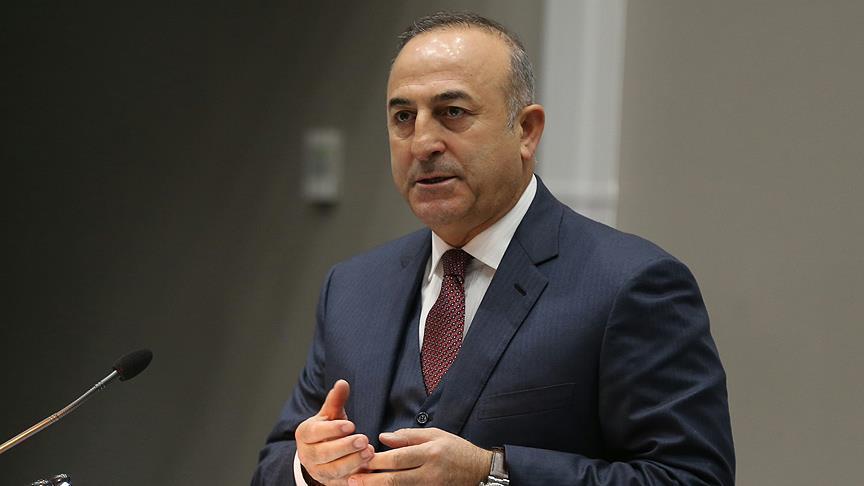
The Greek decision to extend its territorial waters to 12 miles in the Aegean Sea will be regarded as a cause of war (casus belli) as declared by the Turkish Parliament in 1995, Turkey’s top diplomat has said informing that the research vessel Oruç Reis will continue its seismic works in the eastern Mediterranean for 90 days amid ongoing tension with Greece.
“[Greece’s] extending territorial waters to 12 miles in the Ionian Sea is not our concern. But they cannot do it in the Aegean. A decision taken by our parliament years ago is valid today. It’s a cause of a war,” Foreign Minister Mevlüt Çavuşoğlu told the private broadcaster A Haber in an interview late Aug. 29.
Çavuşoğlu referred to a decision taken by the Turkish Parliament in 1995 to urge Greece that any attempt to extend the territorial waters to 12 miles would be considered “casus belli.” Greece claims it has the right to extend its territorial waters to 12 miles in line with the 1982-dated U.N. convention on the law of the sea. Turkey is not a party to the convention.
Greece has recently decided to extend its territorial waters to 12 miles in the Ionian Sea after it signed a maritime delimitation agreement with Italy.
Tension between Turkey and Greece has ominously escalated in the eastern Mediterranean as both countries are accusing each other of violating its continental shelf. Turkey has dispatched the Oruç Reis research vessel accompanied with the naval forces to explore potential hydrocarbon reserves in an area claimed by Greece as its sovereign waters in light of a maritime jurisdiction deal with Egypt signed on Aug. 6.
Çavuşoğlu informed that Turkey and Greece agreed Aug. 7 to jointly announce the resumption of the “exploratory talks,” a mechanism set in 2002 for the resolution of the problems stemming from the Aegean Sea but stalled in 2016, but the latter signed the controversial deal with Egypt just a day before.
“They knew that these talks wouldn’t take place after they signed this deal. They did it on purpose. At the end of the day, the reason why we are at this point now is Greece and Greek Cyprus’ efforts to ignore the rights of Turkey. Tension has increased only after Turkey has started to respond and protect its rights and the rights of the Turkish Cypriots,” he stated.
Oruç Reis will continue its work
The foreign minister also informed that Turkey’s research vessel Oruç Reis will continue its seismic works in the Mediterranean. “According to the information given by our energy minister at a cabinet meeting, Oruç Reis will continue its work starting from the southernmost to the north, towards our territorial waters. This will approximately take 90 days but Navtex [advisory to sailors] will be issued gradually,” Çavuşoğlu said.
According to a current Navtex, the Oruç Reis will stay in the disputed area until Sept. 11.
Sanctions will not lead to solution
The foreign minister also touched on a recent EU meeting in Berlin that urged Turkey to cease its activities in the area or will be sanctioned, probably at a leaders’ summit on the eastern Mediterranean on Sept. 24.
“EU should be an honest broker and not take sides. What the EU should do, as it does against us, is to reveal the points on which Greece is not right and tell that its support is not unconditional,” Çavuşoğlu said, adding the EU will not be able to find a solution by imposing sanctions on Turkey.
France is weakening NATO
One of the countries pledging full support to Greece is EU’s heavyweight France, which deployed warplanes and warships to the Mediterranean and thus caused the escalation, the minister stated.
“The game is even bigger there. Do you know why France and some others are provoking the incidents? France has said ‘NATO is brain dead’ and now is in the leadership race in Europe,” he said.
France is trying to push the EU to form its own armed forces and thus is trying to weaken the NATO through the ongoing tension between Turkey and Greece, two important members of the alliance, Çavuşoğlu said.
EU mulls sanctions
The EU on Aug. 27 warned Turkey it could face fresh sanctions, including tough economic measures, unless progress is made in reducing soaring tensions with Greece and Cyprus in the eastern Mediterranean.
“We agreed that in the absence of progress in engaging Turkey we could develop a list of further restrictive measures that could be discussed at the European Council on Sept. 24 and 25,” Borrell said after the talks.
But Borrell was also quoted as saying that the EU wants to give “a serious chance to dialogue” with Turkey and hailed the efforts of term president Germany to this end.